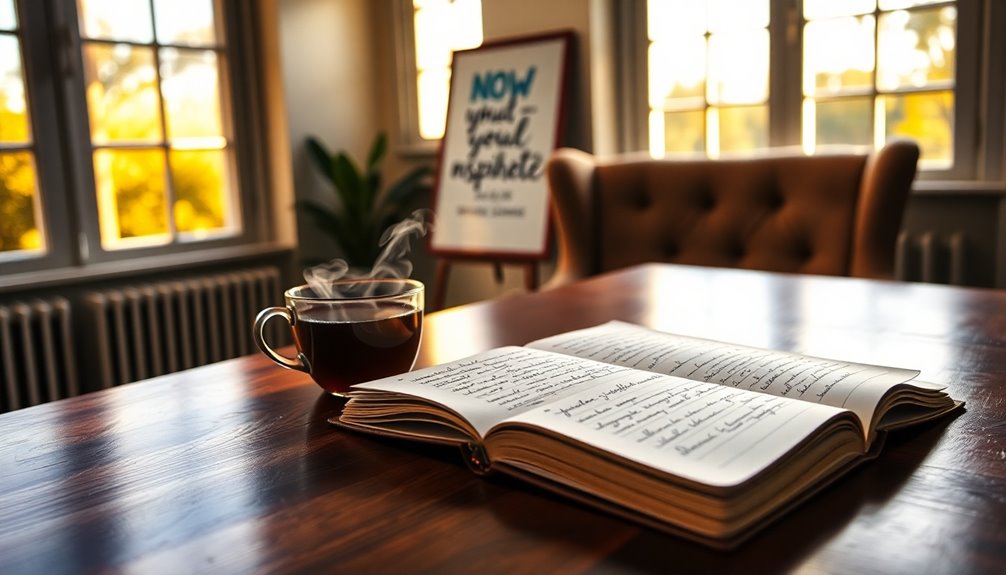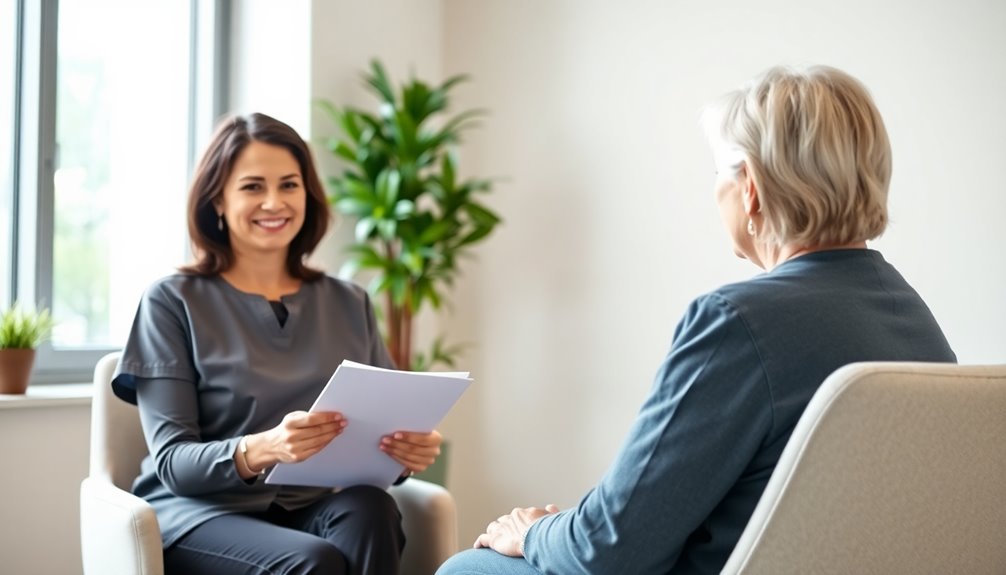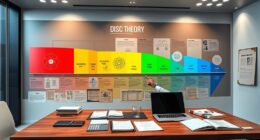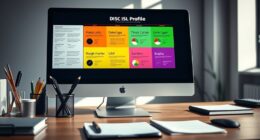To avoid costly interview blunders, focus on a few key areas. Arrive 10-15 minutes early to show your respect for the interviewer's time. Dress in professional attire, as it communicates your seriousness about the position. Eliminate distractions by turning off your cellphone and stay engaged. Properly prepare by researching the company and anticipating questions. Use concise responses and maintain positive body language. Remember, clear communication is essential. By mastering these elements, you'll make a strong first impression that could set you apart. Keep going to discover more tips that will boost your interview performance.
Key Takeaways
- Arrive 10-15 minutes early to demonstrate punctuality and respect for the interviewer's time.
- Dress in formal business attire to convey professionalism and seriousness about the position.
- Turn off your cellphone to minimize distractions and show respect during the interview.
- Prepare thoroughly by researching the company and practicing common interview questions for confident responses.
- Maintain concise, professional communication and engage with thoughtful questions to leave a positive impression.
Importance of Punctuality
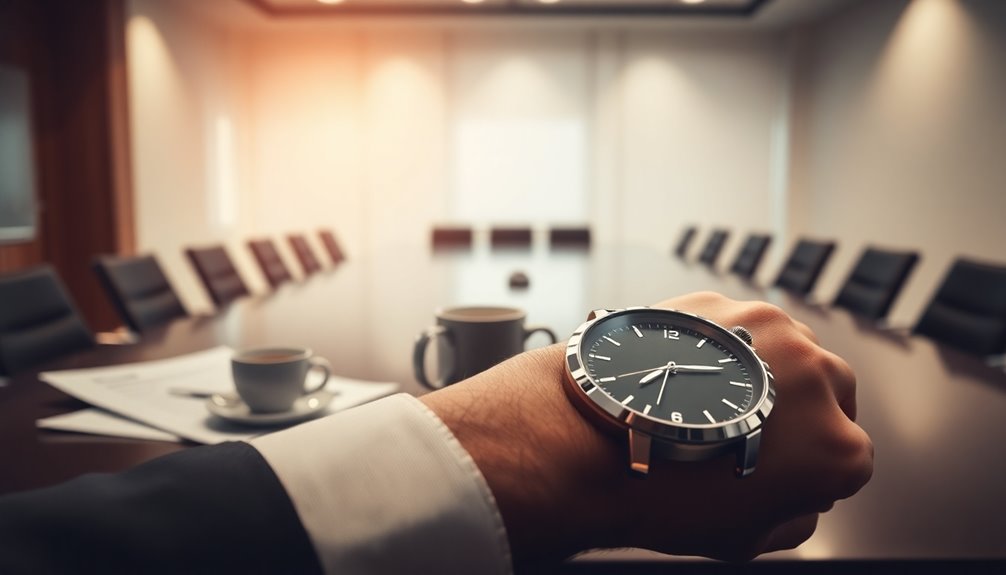
Arriving 10-15 minutes early for your interview isn't just courteous; it sets the tone for a positive first impression.
When you show up on time, you demonstrate respect for the interviewer's schedule, which reflects your professionalism and reliability. This early arrival gives you a chance to gather your thoughts, review your resume, and calm any pre-interview jitters.
It also implies strong time management skills, suggesting you can prioritize tasks effectively. Remember, being punctual can create a welcoming atmosphere and signal your enthusiasm for the position.
Don't underestimate the impact of your timing; it can be a critical factor in how the interviewer perceives you. So, plan accordingly and make punctuality a priority.
Professional Attire Choices
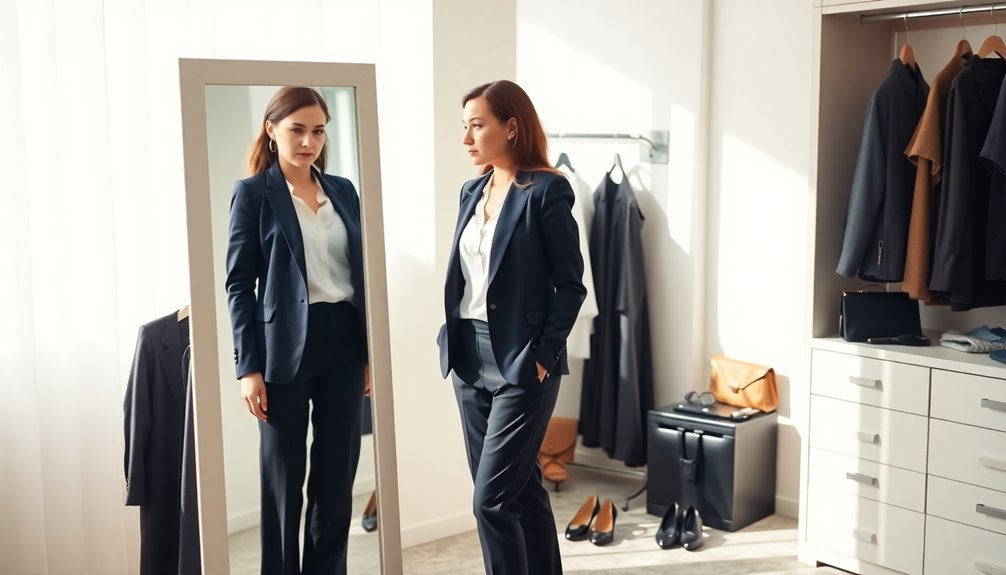
Your choice of professional attire plays an essential role in making a strong impression during an interview. Dressing appropriately signals your seriousness about the position and reflects your professionalism.
Whether the company has a casual dress code or not, opting for formal business attire is always a safe bet.
Here are some tips to keep in mind:
- Invest time in selecting and preparing your outfit in advance to avoid last-minute stress.
- Choose properly ironed clothing to demonstrate attention to detail and care in your appearance.
- Wear polished shoes to complete your look and enhance your confidence.
Focus and Distraction Management

How can you guarantee you're fully present during an interview? First, turn off your cellphone. This simple action eliminates distractions and shows respect for the interviewer.
Instead of scrolling through your phone while waiting, use that time to review your resume and mentally prepare. Make sure you get adequate sleep and eat well before the interview; this keeps your energy levels up and sharpens your focus.
Practice active listening during the conversation—engage with the interviewer by nodding and responding thoughtfully. Demonstrating enthusiasm not only helps you stay connected but also leaves a positive impression.
Preparation and Research Essentials
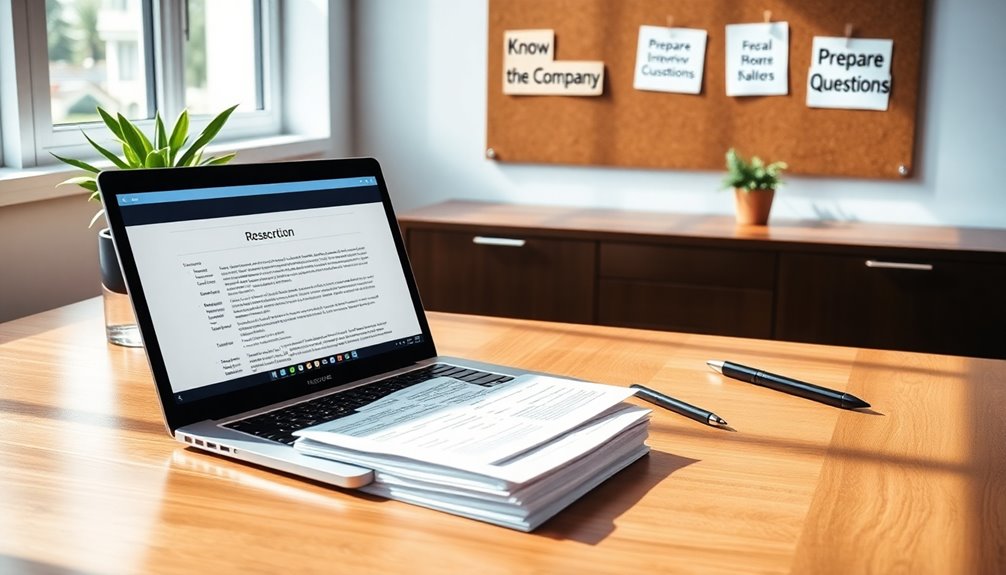
Before stepping into the interview room, thorough preparation and research can greatly enhance your confidence and performance. Understanding the company and its values will help you make a strong impression.
Here are key aspects to focus on:
- Research the company's clients, specialties, and culture to align your responses.
- Anticipate common interview questions and practice your answers to sound natural.
- Bring extra copies of your resume for yourself and the interviewer.
Effective Communication Skills

Effective communication skills are essential in an interview setting, as they can make or break your chances of landing the job. You should practice concise responses and avoid rambling. Keep your answers professional, and steer clear of negative comments about past employers. Your body language also matters—maintain eye contact and an open posture to convey confidence.
Here's a quick reference table to enhance your communication approach:
| Key Element | Effective Tips | What to Avoid |
|---|---|---|
| Clarity | Be direct and to the point | Overloading with details |
| Professionalism | Use appropriate language | Slang and informal terms |
| Engagement | Ask thoughtful questions | Ignoring the interviewer's cues |
Following these tips can greatly improve your interview performance.
Frequently Asked Questions
What Should I Do if I'm Running Late to an Interview?
If you're running late to an interview, don't panic.
First, call the interviewer as soon as you realize you'll be delayed, and apologize for the inconvenience. Estimate your arrival time and offer to reschedule if necessary.
Once you arrive, stay calm and composed. Acknowledge your tardiness, but don't dwell on it.
Focus on making a positive impression with your professionalism and enthusiasm throughout the interview.
How Can I Choose the Right Accessories for an Interview Outfit?
Choosing the right accessories for your interview outfit is key.
Stick to simple, elegant pieces that complement your attire without overwhelming it. Opt for a classic watch or subtle jewelry, like stud earrings.
If you wear a tie or scarf, make sure it matches your overall look. Keep your bag professional and organized.
Is It Acceptable to Bring a Drink to the Interview?
Picture stepping into an interview like entering a stage—every detail matters.
It's best to avoid bringing a drink to the interview. You want to keep your focus sharp and show professionalism. Sipping on a beverage might distract you or seem disrespectful to the interviewer.
Instead, hydrate beforehand and arrive ready to engage. This way, you'll shine like a star, fully prepared to make a lasting impression.
What Should I Do if I'm Asked an Unexpected Question?
When you face an unexpected question during an interview, take a moment to gather your thoughts.
It's okay to pause; this shows you're considering your response seriously. You can also rephrase the question to clarify if needed.
If you're unsure, share your thought process or relate it to your experiences. Staying calm and composed reflects your problem-solving skills, which interviewers often appreciate.
How Do I Follow up if I Haven't Heard Back After the Interview?
If you haven't heard back after the interview, it's perfectly fine to follow up.
Wait about a week or two, then send a polite email expressing your continued interest in the position. Thank them for the opportunity, and briefly reiterate why you're a great fit.
Keep it concise and professional, as this shows your enthusiasm and respect for their time. It can help you stand out and potentially receive a response.
Conclusion
To sum up, avoiding these costly interview blunders can greatly boost your chances of success. Picture yourself entering the interview room on time, dressed professionally, and confidently engaging with your interviewer. By prioritizing punctuality, choosing the right attire, managing distractions, preparing thoroughly, and communicating effectively, you create a compelling image of a qualified candidate. Remember, every detail counts, and with the right preparation, you can turn your interview into an opportunity that leads to your dream job.
Eugene brings a fresh, dynamic voice to our platform as one of our talented Writers. Specializing in research-driven content, he explores the latest findings in psychology and personal growth, translating them into actionable insights for our readers. Eugene’s work is fueled by a curiosity about what makes us tick and a desire to help others unlock their potential.




